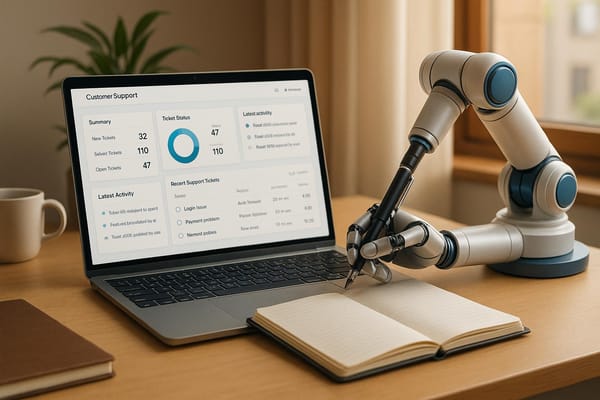How AI Improves Knowledge Sharing in Teams
Explore how AI enhances knowledge sharing in teams by improving access, organization, collaboration, and security of information.

AI is transforming how teams share and manage knowledge, making it easier to access, organize, and maintain critical information. Here’s a quick summary of how AI helps:
- Faster Access to Information: AI-powered search tools understand context and intent, delivering precise answers quickly.
- Centralized Knowledge Hubs: AI gathers and organizes data from multiple sources, ensuring everyone works with the same up-to-date information.
- Improved Collaboration: AI identifies knowledge gaps, creates consistent replies, and supports multilingual content for global teams.
- Time Savings: Automates repetitive tasks like summarizing conversations, updating knowledge bases, and generating content.
- Enhanced Security: AI safely stores and preserves company expertise for long-term use.
Main Advantages of AI Knowledge Sharing
Connecting Team Information
AI is transforming how teams share and access information across departments. By automatically gathering data from multiple sources, it creates a central hub for knowledge, breaking down silos and ensuring everyone works with the same up-to-date information. For instance, in customer support, AI-driven platforms like HelpJam allow teams to quickly find product documentation, past customer interactions, or solution templates. These tools make it easier to organize resources and access critical information when needed. Additionally, AI improves how teams search for information, offering more accurate and reliable results.
Improved Information Search
AI-powered search tools do more than match keywords - they understand the context and intent behind queries. This means team members can find exactly what they need, even if they phrase their questions differently. By analyzing previous interactions, related topics, and common patterns, these tools deliver precise answers. On top of that, AI continuously updates key information, ensuring that institutional knowledge remains current and accessible.
Keeping Company Knowledge Safe
One of the standout benefits of AI knowledge sharing is its role in preserving and securing company expertise. AI systems document important interactions, update knowledge base articles, and analyze conversations to identify missing information. They also provide secure storage for sensitive data, ensuring that valuable knowledge is protected while remaining accessible for consistent and accurate use. This ongoing process helps safeguard a company's intellectual resources for the long term.
How to Set Up AI Knowledge Sharing
Set Clear Goals
Identify measurable objectives to improve how your team shares knowledge. Focus on tangible results, like cutting response times, improving information accuracy, or boosting collaboration. For example, aim to lower policy search time by 50% or reduce onboarding duration from two weeks to just five days.
Organize Current Information
Streamline your existing knowledge base by creating clear categories and hierarchies. Use descriptive titles and tags to make everything easier to find. Key areas to organize include:
- Product documentation
- Internal processes
- Customer support materials
- Training resources
- Company policies
Select AI Tools
Pick AI tools that match your team's specific needs and workflows. Look for features that make knowledge sharing more efficient and user-friendly. Here's what to consider:
| Feature Category | Key Capabilities | Benefits |
|---|---|---|
| Content Management | AI-powered text editor, multilingual support | Speed up content creation and translation |
| Search Functionality | Context-aware search, natural language processing | Locate information quickly and accurately |
| Integration Options | API access, webhook support | Connect seamlessly with existing tools |
| Analytics | Usage tracking, performance metrics | Monitor and improve knowledge sharing |
HelpJam is one example that offers these features, including unlimited articles and built-in AI for content creation and translation.
Set Up AI Learning
Customize your AI by training it with your company's data for accurate and relevant responses. Start by integrating your knowledge base through sitemap files or direct connections. Use the following resources to train the AI:
- Knowledge base articles
- Product documentation
- Customer interaction history
- Internal process guides
Ongoing training and feedback will help fine-tune the AI to meet your organization's unique needs. Once ready, incorporate the AI into your team's daily workflow.
Add AI to Daily Work
Introduce AI tools gradually into your team's routine tasks. Start small - like using AI for document searches or content creation - before expanding to more complex integrations. For customer support teams, AI can assist with:
- Summarizing customer interactions
- Creating response templates
- Proofreading communications
- Translating materials for global teams
Set up role-based permissions to control access and maintain security. Use analytics to track how the team is adopting the tools and pinpoint areas for improvement.
Encourage your team to rely on AI for repetitive tasks, share success stories, and provide feedback to refine the process further.
Examples of AI Knowledge Sharing
Here are some ways AI is making a real difference in knowledge sharing across various teams.
Support Team Results
AI is changing how support teams handle customer inquiries. With AI chatbots trained on knowledge bases, PDFs, and web pages, support staff can:
- Access information instantly to respond faster
- Ensure consistent responses with AI-assisted proofreading
- Scale operations without needing to hire more people
Real-time analytics help track resolution times and customer satisfaction. Teams can also customize chatbot prompts and set rate limits to fine-tune performance.
Remote Team Success
AI tools are a game-changer for remote teams, helping them overcome common challenges:
| Challenge | AI Solution | Impact |
|---|---|---|
| Time zone delays | 24/7 AI chatbot access | Instant access to information |
| Language barriers | Multilingual knowledge base | Support in the preferred language |
| Information silos | Centralized AI-powered search | Unified access to shared knowledge |
| Documentation gaps | AI-assisted content creation | Faster updates to knowledge resources |
These tools give remote teams immediate access to critical information, no matter where they are. Multilingual features also ensure everyone can communicate and share ideas in their preferred language, breaking down communication barriers.
Growth Company Benefits
Expanding companies often face challenges in keeping knowledge sharing consistent. AI tools help tackle these issues by offering:
1. Streamlined Onboarding
AI-powered knowledge bases speed up training for new hires by giving them instant access to company information and best practices. These systems also adapt and update as they learn from user interactions, keeping content accurate and relevant.
2. Scalable Management and Learning
As companies grow, AI platforms can handle the increasing complexity by:
- Generating and translating content automatically
- Connecting with other tools via APIs and webhooks
- Providing advanced analytics to track how knowledge is being used
"Help Your Customers At Anytime - No More Support Burden" - HelpJam
Track and Improve Results
Measuring and refining AI knowledge sharing is key to boosting team performance. These steps align with earlier strategies for improving how teams share AI-driven insights.
Key Metrics to Watch
Monitoring specific metrics helps assess how well AI is supporting knowledge sharing. Focus on these categories:
| Metric Category | What to Measure | Why It Matters |
|---|---|---|
| Response Speed | Average resolution time, first response time | Indicates how quickly teams share information |
| Knowledge Base Usage | Search volume, article views, successful queries | Shows content relevance and ease of access |
| Team Efficiency | Resolved issues, AI-assisted responses | Highlights productivity improvements |
| Content Quality | Customer satisfaction ratings, feedback scores | Evaluates how effective the shared knowledge is |
Use your platform's analytics tools - like HelpJam’s built-in real-time analytics - to identify trends and areas needing improvement.
Gathering Team Feedback
Regular feedback is essential for fine-tuning AI performance. Here’s how to incorporate it:
-
Feedback Sessions
Schedule monthly meetings to review AI performance and collect improvement ideas. -
Learning from Interactions
Analyze conversations and resolutions to enhance AI capabilities. Use insights from customer interactions to:- Train AI chatbots with updated information
- Enhance response accuracy
- Spot frequently asked questions
- Refresh knowledge base content
-
Optimizing Performance
Leverage analytics to assess the effectiveness of your knowledge base and customer interactions. Address gaps promptly based on the data.
Keeping Content Up-to-Date
Consistently updating content ensures it stays relevant and useful.
Review Schedule
- Daily: Check chatbot interactions for potential issues.
- Weekly: Update popular articles to reflect current needs.
- Monthly: Review analytics to uncover knowledge gaps.
- Quarterly: Conduct a full audit of your content.
Efficient Content Management
- Use AI tools to identify trending topics and adjust articles accordingly.
- Maintain multilingual content for teams across different regions.
- Archive outdated information while keeping historical data accessible.
Summary
AI is changing how teams share knowledge and work more efficiently. By using AI-powered tools, teams can overcome common obstacles in sharing information, ensuring it stays accessible and up-to-date.
Platforms like HelpJam showcase how AI can enhance team knowledge sharing through features like:
- Automated processing
- Smart content creation
- Instant information access
- Insights based on data
To make the most of these tools, organizations need a thoughtful setup and ongoing adjustments. Key steps include setting clear goals, organizing information effectively, training the AI with quality data, keeping content updated, and actively gathering team feedback.
When AI integration is paired with clear objectives and regular input from users, it delivers the best results. As workplaces continue to evolve, AI-driven platforms play a crucial role in maintaining team productivity and consistent information flow. A strategic approach and continuous improvements help create a more connected and efficient work environment.
"Help Your Customers At Anytime - No More Support Burden" - HelpJam
FAQs
How does AI help keep a knowledge base accurate and up-to-date?
AI plays a key role in keeping a knowledge base accurate and current by automating time-consuming tasks like indexing and updating articles. It can identify outdated content, suggest improvements, and even generate new material based on emerging trends or frequently asked questions.
With tools like AI-powered editors, teams can quickly create or translate content, ensuring consistency and relevance. Additionally, advanced analytics provide insights into how users interact with the knowledge base, helping teams refine their content strategy and address gaps effectively. This ensures your team always has reliable, up-to-date information at their fingertips.
How can companies successfully integrate AI tools to improve team knowledge sharing?
To successfully integrate AI tools into team knowledge sharing, companies should focus on leveraging AI-powered features that enhance collaboration and efficiency. Tools like AI chatbots, automated content creation, and real-time analytics can help streamline processes by centralizing information and making it easily accessible to team members.
For example, AI can assist in creating and maintaining a multilingual knowledge base, ensuring that important information is available to diverse teams or customers. Additionally, shared inbox management and live chat features powered by AI can help teams respond faster, improve customer satisfaction, and foster seamless communication. These steps not only optimize operations but also enable teams to work smarter and more effectively.
How does AI help protect and preserve sensitive company knowledge?
AI plays a key role in safeguarding sensitive company knowledge by implementing advanced security measures and ensuring data integrity. AI-powered platforms can use encryption, access controls, and continuous monitoring to prevent unauthorized access and protect confidential information.
Additionally, AI can automate data backups and version control, ensuring important knowledge is preserved and recoverable if needed. These tools also help identify and mitigate potential risks, offering teams peace of mind when sharing and managing critical information.





